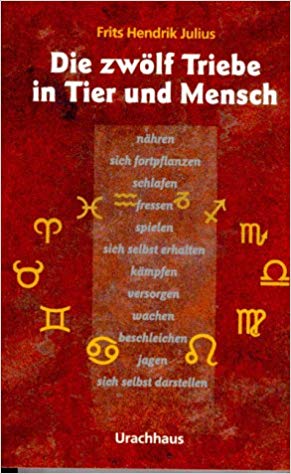Drive: Difference between revisions
(Created page with "'''Drives''' arise from the inner vital life needs of a living being that strive for fulfilment. They are an expression of the will in the etheric body. == In...") |
No edit summary |
||
| Line 1: | Line 1: | ||
[[File:Julius Twelve Drives.jpg|thumb|[[a:Frits Julius|Frits Julius]]: ''Die zwölf Triebe in Tier und Mensch'']] | |||
'''Drives''' arise from the inner vital [[life]] needs of a [[living being]] that strive for fulfilment. They are an expression of the [[will]] in the [[etheric body]]. | '''Drives''' arise from the inner vital [[life]] needs of a [[living being]] that strive for fulfilment. They are an expression of the [[will]] in the [[etheric body]]. | ||
| Line 9: | Line 11: | ||
== Literature == | == Literature == | ||
* [[Frits Julius]]: ''Die zwölf Triebe in Tier und Mensch: Eine kosmisch orientierte Triebpsychologie'', Urachhaus Verlag, Stuttgart 1996, ISBN 978-3825170769 | * [[a:Frits Julius|Frits Julius]]: ''Die zwölf Triebe in Tier und Mensch: Eine kosmisch orientierte Triebpsychologie'', Urachhaus Verlag, Stuttgart 1996, ISBN 978-3825170769 | ||
* [[Rudolf Steiner]]: ''Mythen und Sagen. Okkulte Zeichen und Symbole'', [[GA 101]] (1992), ISBN 3-7274-1010-8 {{Lectures|101}} | * [[Rudolf Steiner]]: ''Mythen und Sagen. Okkulte Zeichen und Symbole'', [[GA 101]] (1992), ISBN 3-7274-1010-8 {{Lectures|101}} | ||
* [[Rudolf Steiner]]: ''Kunst- und Lebensfragen im Lichte der Geisteswissenschaft'', [[GA 162]] (2000), ISBN 3-7274-1620-3 {{Lectures|162}} | * [[Rudolf Steiner]]: ''Kunst- und Lebensfragen im Lichte der Geisteswissenschaft'', [[GA 162]] (2000), ISBN 3-7274-1620-3 {{Lectures|162}} | ||
Revision as of 08:15, 14 April 2022

Drives arise from the inner vital life needs of a living being that strive for fulfilment. They are an expression of the will in the etheric body.
Instinct, drive and desire
The drive, which has its origin in the etheric body, thus differs both from instinct-guided behaviour, which is directly rooted in the physical body, and from desire, which emanates from the needs of the astral body. In humans, conscious action is guided by motives that arise from the I, the spiritual core of man.
In the plant world, the drive expresses itself in its purest form only as an unconscious (→ sleep consciousness) chaste growth instinct. In animals and humans, it is reflected in the form of pleasure or displeasure in the astral body, in which it very easily arouses desires that are almost inseparable from the drive. Examples of this are, for example, the food drive, which serves the preservation of the individual living being, or the reproductive drive, which is directed towards the preservation of the species. It is a high spiritual developmental task to make the drives chaste again, i.e. to purify them of the desires that arise from the unpurified astral body (→ catharsis).
Literature
- Frits Julius: Die zwölf Triebe in Tier und Mensch: Eine kosmisch orientierte Triebpsychologie, Urachhaus Verlag, Stuttgart 1996, ISBN 978-3825170769
- Rudolf Steiner: Mythen und Sagen. Okkulte Zeichen und Symbole, GA 101 (1992), ISBN 3-7274-1010-8 English: rsarchive.org German: pdf pdf(2) html mobi epub archive.org
- Rudolf Steiner: Kunst- und Lebensfragen im Lichte der Geisteswissenschaft, GA 162 (2000), ISBN 3-7274-1620-3 English: rsarchive.org German: pdf pdf(2) html mobi epub archive.org
- Rudolf Steiner: Der Tod als Lebenswandlung, GA 182 (1996), ISBN 3-7274-1820-6 English: rsarchive.org German: pdf pdf(2) html mobi epub archive.org
- Rudolf Steiner: Allgemeine Menschenkunde als Grundlage der Pädagogik, GA 293 (1992), Vierter Vortrag, Stuttgart, 25. August 1919 English: rsarchive.org German: pdf pdf(2) html mobi epub archive.org
 |
References to the work of Rudolf Steiner follow Rudolf Steiner's Collected Works (CW or GA), Rudolf Steiner Verlag, Dornach/Switzerland, unless otherwise stated.
Email: verlag@steinerverlag.com URL: www.steinerverlag.com. Index to the Complete Works of Rudolf Steiner - Aelzina Books A complete list by Volume Number and a full list of known English translations you may also find at Rudolf Steiner's Collected Works Rudolf Steiner Archive - The largest online collection of Rudolf Steiner's books, lectures and articles in English. Rudolf Steiner Audio - Recorded and Read by Dale Brunsvold steinerbooks.org - Anthroposophic Press Inc. (USA) Rudolf Steiner Handbook - Christian Karl's proven standard work for orientation in Rudolf Steiner's Collected Works for free download as PDF. |
